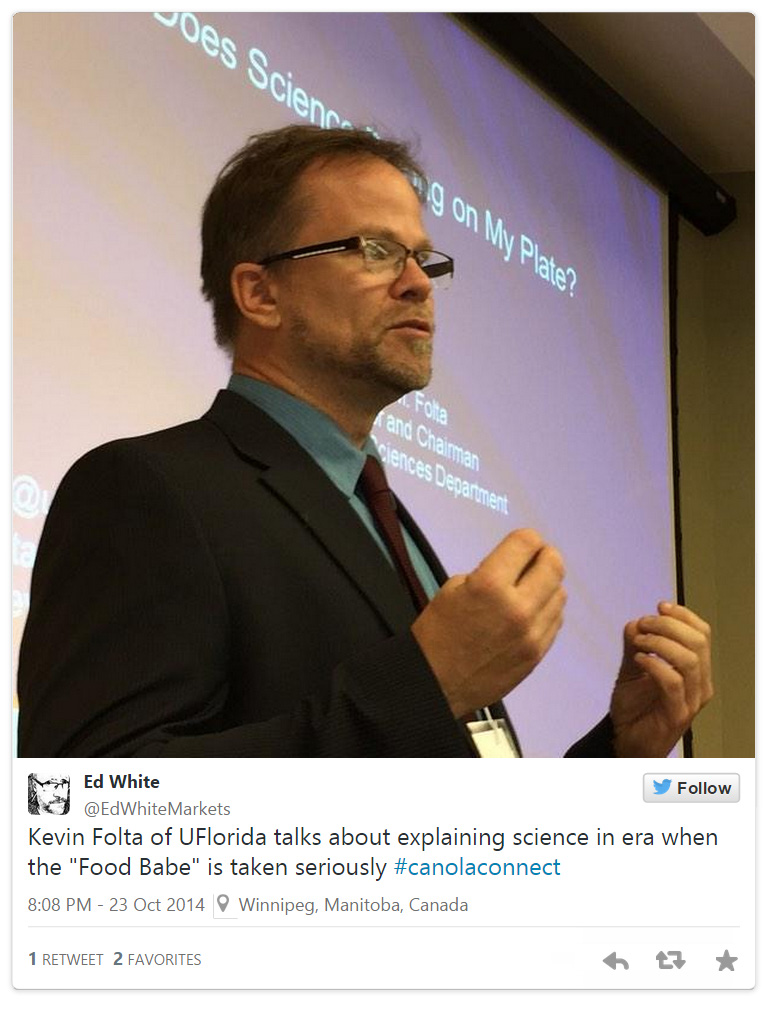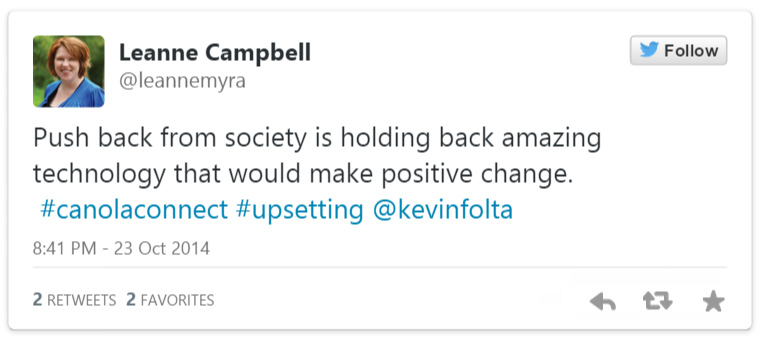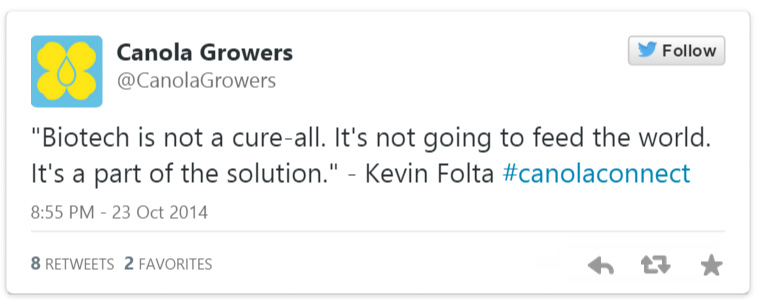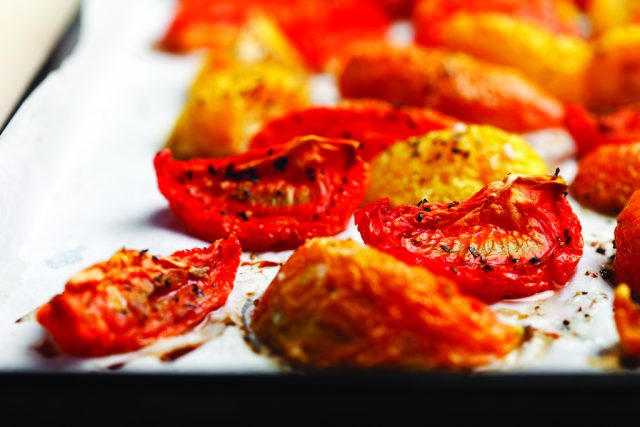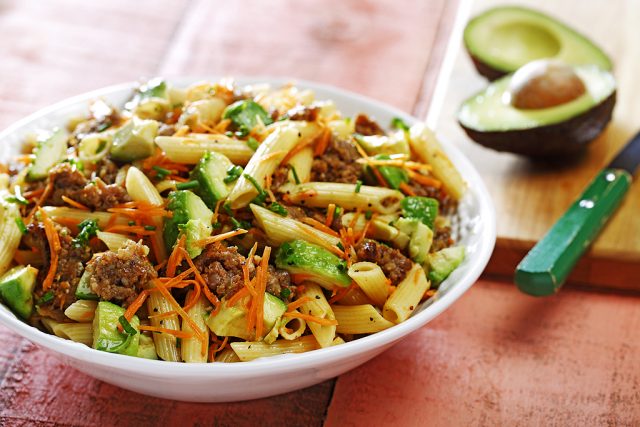A #CanolaConnect event took place October 23rd, 2014 at the Richardson Centre for Functional Foods and Nutraceuticals. The science of GMOs and food processing was presented by Nancy Ames of Agriculture and Agri-Food Canada and the University of Florida’s Dr. Kevin Folta.
Here is Sandi Knight’s recap of guest presenter Dr. Kevin Folta:
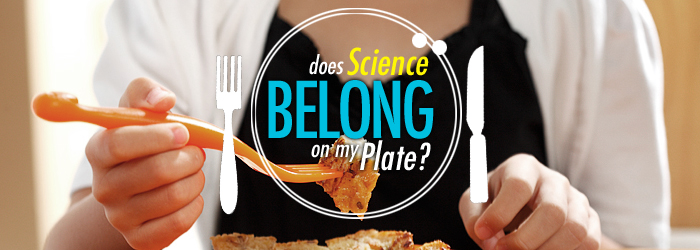
Does Science Belong on My Plate?
GMOs, transgenic technology, biotech crops – want to start a food debate? This is definitely a hot topic. But why?
Kevin Folta, horticulture research scientist from the University of Florida, gave an enlightening and comprehensive presentation on this subject.
Many consumers fear GMOs (genetically modified organisms) even though they aren’t exactly sure what they are or how they work. This technology is currently used in 8 crops – corn, canola, soybeans, cotton, papaya, sugar beets and squash. It is a precise extension of conventional plant breeding, changing only 1 – 3 genes instead of 10,000 to 800,000 and takes less than 5 years to develop as opposed to 5 to 30 years. It is tested and safe – in 17 years not one case of illness or death has been related to GMOs.
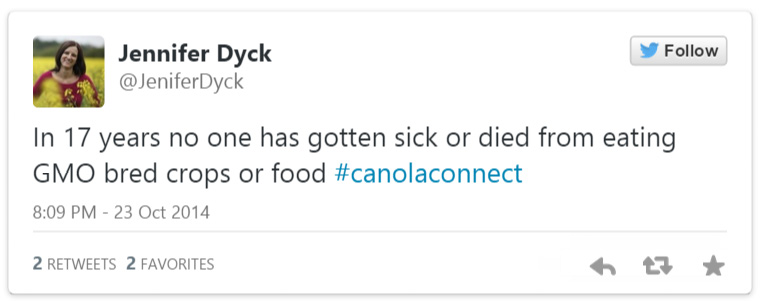
The technology may be relatively new, but humans have been manipulating plant genetics for more than 10,000 years. As the world’s population increases, we must continue to move forward in developing genetics and production methods to generate better quality and increased yields on the same land-base with fewer inputs. Some want ‘natural’ food, but Dr. Folta advised nothing we eat is ‘natural’; it has all changed from its original form.
The most sobering part of the presentation was learning of available solutions being blocked because of misinformation, fear and activism. Strawberries could be grown without fungicides by a single gene within the strawberry simply being ‘turned up’ all the way. Golden rice, rich in Vitamin A, can prevent blindness and death. Root disease can be stopped in cassava, a nutrient rich root vegetable. Drought resistance maize could be grown. The allergy gene in peanuts could be ‘turned off’. Black spot and wilt could be prevented in tomatoes. The decimated American chestnut could be restored. Browning in apples and potatoes eliminated. Oil content and quality improved in soybeans and canola. Disease stopped in grapes, eggplant and citrus crops. While this technology sits on a shelf, the benefits to farmers, consumers, the environment are being lost. Most striking are solutions to drought, famine and disease in developing nations not being implemented because of activism from first world countries where food is abundant, plentiful, affordable and safe.
Fear and risk are being manufactured and sold by so-called experts. Correlation is being cited, not causation. The public is torn as to who to believe. Biotechnology is only part of the solution in feeding our growing world, but it shouldn’t be opposed for invalid reasons. Science and reason, not fear, should lead the way and then perhaps the debate would stop.
Eat well…Sandi
Does Science Belong on Your Plate? A #CanolaConnect series brought to you by the Manitoba Canola Growers. This is the 3rd #CanolaConnect event that brings together experts in their fields with consumers, chefs, dietitians, home economists and teachers.
Check out our social media recap from the event here.
Web Sources:
www.geneticliteracyproject.com
Books:
Tomorrow’s Table: Organic Farming, Genetics, and the Future of Food by Pamela C. Ronald, Raoul W. Adamchak
No More Food Fights! Growing a Productive Farm & Food Conversationby Michele Payn-Knoper
The Impact on Genetically Engineered Crops on Farm Sustainability in the United States

